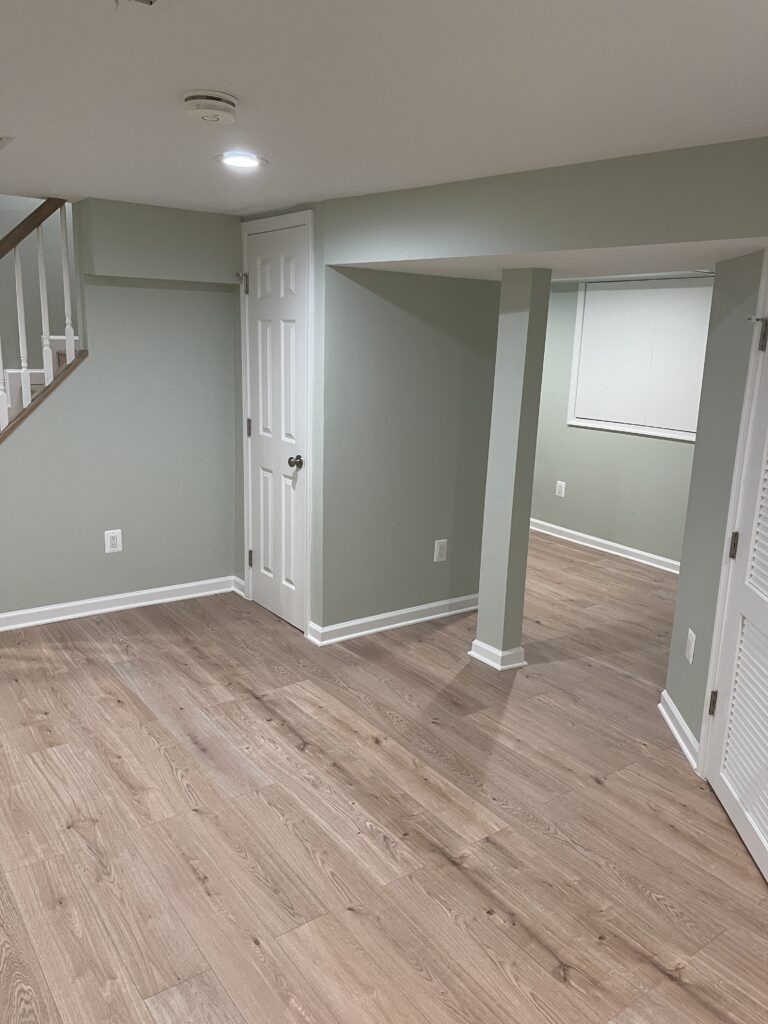Regarding flooring for a basement that floods, you have two main options: raised basement flooring and waterproof basement flooring. Raised basement flooring is a great option to keep your basement dry, as it lifts the floor off the ground and away from potential water damage. This type of flooring is usually made of composite plastic panels installed on a concrete base. The panels are typically designed to resist moisture, and the concrete base helps keep the flooring from shifting due to water pressure. Waterproof basement flooring is an excellent option for basements that are prone to flooding. This type of flooring is usually made of a waterproof material designed to keep any water from seeping through. It is generally installed over a concrete subfloor and can be sealed to ensure no water leaks. The type of flooring you choose for your basement should depend on the flooding you experience and your budget. Both raised and waterproof basement flooring can provide a great way to protect your basement from flooding and keep it dry and comfortable.

When finishing your basement, choosing the right flooring is crucial. Basements are prone to moisture and flooding, so selecting a flooring option that can withstand these conditions is essential.
This article will explore three popular basement flooring options and help you choose the best one for your space.
Why Basement Flooring Is Different
For several reasons, basement flooring is different from other areas of your home. Basements are typically below ground level, making them more susceptible to moisture and humidity. They also tend to have concrete floors, which can be cold and uncomfortable to walk on.
Additionally, basements are often used for storage, laundry, and other activities that can cause wear and tear on flooring. Therefore, choosing a flooring option that can withstand these conditions and provide a comfortable and durable surface is essential.
Raised Basement Flooring
by Mateus Campos Felipe (https://unsplash.com/@matcfelipe)
Raised basement flooring is a popular option for basements that are prone to flooding. This flooring is installed on top of the existing concrete floor, creating a raised surface that protects your flooring from any potential water damage.
Raised basement flooring is typically made of interlocking tiles or panels, making it easy to install and remove if needed. It also provides a thermal barrier, making it more comfortable to walk on than concrete.
Vinyl Flooring
Vinyl flooring is another popular basement option due to its durability and water-resistant properties. It’s also relatively easy to install, making it a popular choice for DIY projects.
Vinyl flooring comes in various styles, including planks, tiles, and sheets, allowing you to choose the best option for your space. It’s also budget-friendly, making it an excellent choice for those on a tight budget.
Epoxy Flooring
Epoxy flooring is a durable and long-lasting option for basements. It’s made of a resin and hardener mixture that creates a strong and seamless surface. Epoxy flooring is also resistant to water, chemicals, and stains, making it an ideal choice for basements that may experience spills or leaks.
Epoxy flooring is available in various colors and finishes, allowing you to customize the look of your basement. It’s also relatively easy to clean and maintain, making it a low-maintenance option for busy homeowners.
Factors to Consider When Choosing Basement Flooring
When choosing the best flooring option for your basement, there are several factors to consider. These include:
Moisture and Flooding
As mentioned earlier, basements are prone to moisture and flooding, so choosing a flooring option that can withstand these conditions is essential. Raised basement and vinyl flooring are water-resistant options, while epoxy flooring is waterproof.
Comfort
Since basements tend to have concrete floors, choosing a flooring option that provides comfort and warmth is essential. Raised basement and vinyl flooring provide a thermal barrier, making them more comfortable to walk on than concrete. Epoxy flooring, on the other hand, can be cold and uncomfortable to walk on, making it less suitable for areas where you’ll be spending a lot of time.
Durability
Basements are often used for storage and other activities that can cause wear and tear on flooring. Therefore, choosing a durable option that can withstand heavy foot traffic and potential spills or leaks is crucial. Raised basement, vinyl, and epoxy flooring are all durable options, with epoxy flooring being the most damage-resistant.
Budget
Your budget is also an essential factor to consider when choosing basement flooring. Raised basement and vinyl flooring are both budget-friendly options, while epoxy flooring can be more expensive. However, investing in a more durable and long-lasting flooring option may save you money in the long run.
How to Choose the Best Basement Flooring for Your Space.
by Paolo Chiabrando (https://unsplash.com/@chiabra)
Now that you know the different types of basement flooring and the factors to consider, here are some tips to help you choose the best option for your space:
Assess Your Needs
Consider how you plan to use your basements and the potential risks it may face, such as moisture or heavy foot traffic. This will help you determine which flooring option is best suited for your space.
Consider Your Budget
Determine how much you’ll spend on your basement flooring and choose an option that fits your budget. Remember that investing in a more durable option may save you money in the long run.
Research Different Options
Do your research and compare different flooring options to determine which one best meets your needs and budget. Consider factors such as durability, comfort, and maintenance requirements.
Consult a Professional
Consult a professional if you’re unsure which flooring is best for your basement. They can assess your space and provide recommendations based on your needs and budget.
Real-world examples of Basement Flooring
Here are some real-world examples of homeowners who have successfully used different basement flooring options:
Raised Basement Flooring
One homeowner in a flood-prone area installed raised basement flooring in their basement to protect their flooring from potential water damage. They could easily install the flooring themselves and have not experienced any issues with flooding since.
Vinyl Flooring
Another homeowner chose vinyl flooring for their basement due to its durability and budget-friendly price. They were able to install the flooring themselves and have been pleased with its performance and easy maintenance.
Epoxy Flooring
A homeowner with a basement used for storage and laundry chose epoxy flooring for its durability and resistance to chemicals and stains. They could customize the look of their basement with different color options and found the flooring easy to clean and maintain.
Conclusion
Choosing the right flooring for your basement is crucial for creating a comfortable and durable space. Consider factors such as moisture and flooding, comfort, durability, and budget when choosing the best option for your space. With the right flooring, you can transform your basement into a functional and inviting area for your family to enjoy.
Contact us today to get your free consultation and free estimate.
